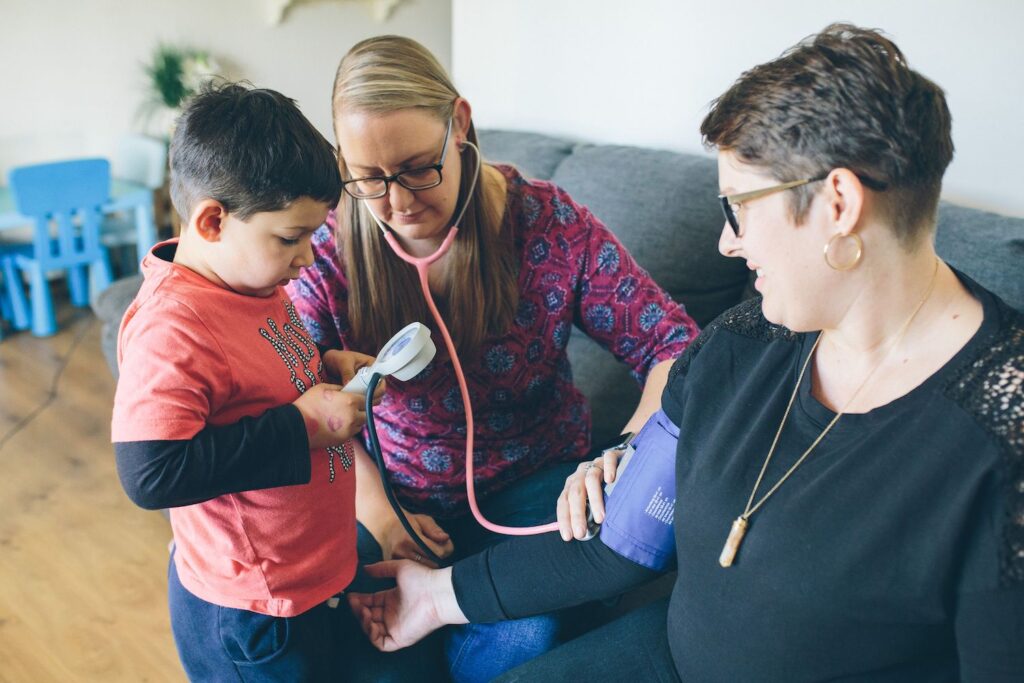FAQs
Frequently Asked Questions
What is a Midwife?
A midwife is a person who has completed a university degree based on the International Confederation of Midwives (ICM) Essential Competencies for Basic Midwifery Practice and the framework of the ICM Global Standards for Midwifery Education. To be registered and/or legally licensed to practise midwifery and use the title, ‘midwife,’ a person must have the required qualifications and demonstrate competency in the practice of midwifery.
What is a Private Practicing Midwife (PPM)?
A Private Practicing Midwife or PPM for short, is a Registered Midwife who has met the requirements of the Nursing and Midwifery governing body to gain ‘Endorsement’ in Australia. An Endorsed Midwife has undergone additional education and training in prescribing medications, pathology and ultrasounds and shown to have a minimum of 3 years of experience in the context of which they will practice. A PPM can offer care for pregnancy (antenatal), labour and birth, and post birth (postnatal) up to 6 weeks after the birth. Our PPM’s provide a range of services dependent on their speciality. Some offer a continuity of care model, providing all levels of services, and others specialise in either antenatal or postnatal care. We also have PPM’s providing specialised education in pregnancy, for example Hypnobirthing and Lactation Consultants focusing on breastfeeding concerns.
Who can see a Privately Practicing Midwife?
PPM services are available to all women/birthing person/parents to be from preconception to 6 weeks post-birth. We offer care and support tailored to your individual needs. We can provide one off education sessions, information about different care options within your personal clinical situation, or specialised support for the whole journey. Care with a PPM can compliment other care models or be used independently for complete continuity of care.
How can I book a PPM?
For a full list of our midwives, please visit our directory.
It is suggested that you contact a PPM located in your geographical area. Some midwives will have certain locations in which they limit their services to. Please contact SAPPM to find out who can provide care in the area near you.
Does Medicare cover PPM services?
If you are eligible for Medicare (born in Australia, permanent resident, or under reciprocal health care agreement) you will receive rebates for a portion of your care with a PPM. The amount Medicare covers will vary according to your individual circumstances (i.e. having a healthcare card or the level of your family safety net). Your midwife will be able to provide you with information on the types of services they offer and the estimated portion of costs Medicare will cover.
Will my private health insurance cover a PPM?
Some health funds will cover midwifery services, including education and postnatal care, and may even cover out of pocket costs associated with your birth. This will be dependent on which health care fund you are with and the level of cover you have. You will need to contact your private health insurance to find out exactly what they will cover. If you birth in hospital with an SAPPM midwife with admitting privileges, by law your health fund must provide at least 25% of the in-hospital fee.
Where can I birth my baby with a Privately Practicing Midwife?
SAPPM strongly believes that women need to birth in an environment in which they feel safe. For some women this may be in a hospital or birth centre, and for others this may be at home. SAPPM has midwives offering homebirth services, antenatal and postnatal care with a planned hospital birth, and a limited number of midwives with admitting privileges offering birth in hospital. There are a large range of options offered and individual to each midwife. Our midwives are happy to discuss how they can support you to ensure you get the right care at the right place for your pregnancy and birth journey.
Can I have a water birth?
The SAPPM midwives offering homebirth services are skilled to facilitate the safe use of water immersion for labour and birth. They will also assist you in organising everything you need for water birth at home. If you are birthing in a public hospital, availability of waterbirth accredited staff and availability of rooms with a bath, will affect your option to waterbirth. You will need to discuss this with the midwives at the birthing hospital.
Do I still need to see a doctor/obstetrician?
The need to see an obstetrician is based on your health history and health during pregnancy. Your midwife will be able to discuss this with you. If you are birthing at a public health facility (hospital) the midwives and doctors there will inform you of the policies and what care pathway they recommend based on your individual circumstances.
What if there are any health issues during my pregnancy or birth?
Your midwife will be continually assessing you and your baby’s health throughout your pregnancy. If your midwife is concerned or suspects something outside of “normal”, they may recommend additional tests and/or refer you to a hospital or doctor to seek further care. This could be an obstetrician, a GP, paediatrician, or a team of specialists at the hospital. SAPPM midwives also work with and refer to a wide range of allied health practitioners and complimentary/alternative therapists to ensure non-critical health issues can be addressed. This list includes acupuncturists, chiropractors, naturopaths, physiotherapists, osteopaths and massage therapists.
Do I need a referral to see a PPM?
Depending on the midwife, it may be necessary to get a referral from your GP to fulfill Medicare requirements. Most homebirth midwives within SAPPM are required to collaborate with your zoned back up hospital to fulfill Medicare and insurance requirements. Your midwife will discuss this with you when you enquire with them.
How much does it cost?
There are many different options for care and each midwife has their own fee structure. Payment plans may be available to suit your budget to ensure you can access the care that you require. You can speak with the midwife directly about service fees and payment plans, including available Medicare rebates. While we believe in accessibility of this model of care for everybody, SAPPM midwives invest a lot of time and effort to support women and their families. Appointments, on average, are longer than standard obstetric and hospital models and most care is offered in your own home. Whilst there is a financial component to private midwifery care, it is money spent on creating a supportive care team and putting yourself at the centre of care to achieve your desired birth outcomes.
Still looking for answers?
If you still have questions that haven’t been addressed above, you can contact a midwife directly through our directory. Otherwise you can send an enquiry to us below.

